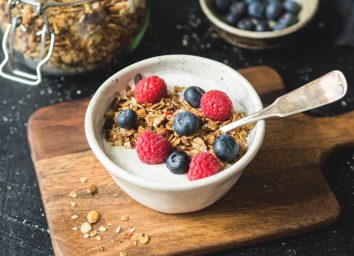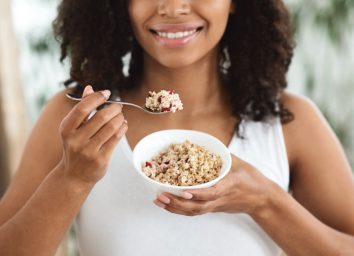The 8 Best Breakfast Habits for Women, Say Dietitians
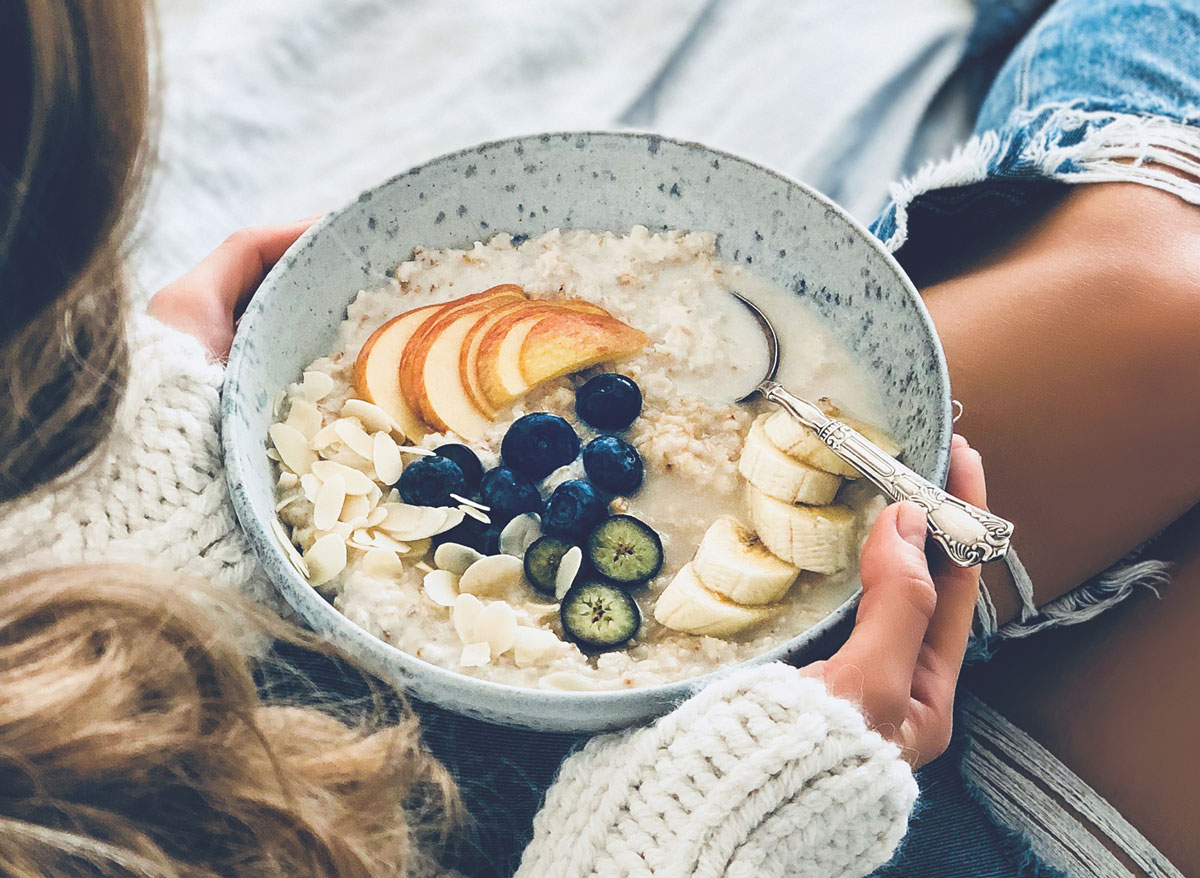
After an overnight fast, eating a balanced breakfast replenishes your energy stores to power you through your morning workout, meetings, and presentations. But when it comes to all the health-boosting benefits of breakfast, it’s what you eat that really matters. Dietitians say there are a handful of super simple strategies you can adopt that will not only help you to meet your daily recommended values of certain nutrients, but also to stave off those stomach rumbles until lunchtime, and potentially aid in your weight loss efforts. This is why it’s important for women to establish a few healthy breakfast habits.
Habits are the small decisions you make every day—and simply opting to eat a morning meal is a good one to adopt in itself. One small 2017 study suggested that eating a sizable breakfast can increase fat burning, improve your overall metabolic health, and even potentially reduce your risk of type 2 diabetes.
“It’s more likely if you start off your day with breakfast, you will continue your day with healthy eating choices and habits,” says Michelle Zive, a registered dietitian and NASM-Certified Nutrition Coach. “The best and most filling meals are those that contain whole grains—which satisfy hunger longer and are better for your digestion—low-fat protein like nonfat milk, yogurt, eggs, as well as whole fruits and/or vegetables.”
In other words, starting your morning on the right foot from a nutritional standpoint can set you up for success for the rest of the day. Here are some of the best breakfast habits women will want to pick up ASAP, according to dietitians. And for more healthy eating tips, be sure to check out our list of 21 Best Healthy Cooking Hacks of All Time.
Try making it your largest meal.
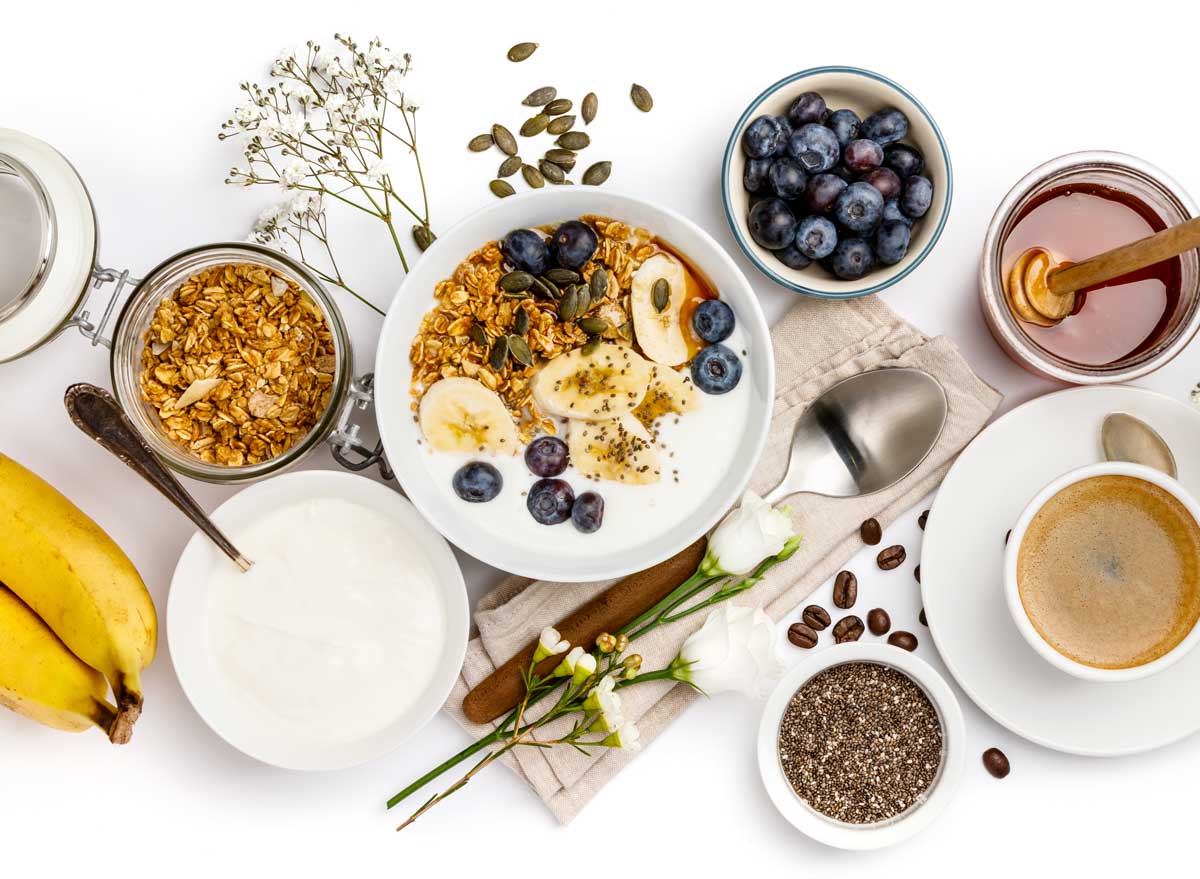
“You’ve heard, breakfast is the most important meal of the day—and I’m here to tell you that is true,” says Sydney Spiewak, registered dietitian and nutritionist at Saint Francis Hospital and Medical Center. “Eating a bigger breakfast helps give your brain enough energy to start the day and kickstart your metabolism.”
Experts agree that eating a satiating breakfast can help to prevent you from overeating later in the day—so don’t be afraid to fill up your plate.
“So many women skimp on breakfast to ‘save calories,'” says Colleen Christensen, a registered dietitian and nutritionist. “However, this will only backfire on you later in the day. Your body will give you the urge to eat past the point of comfortable fullness to essentially make up for the calories you missed out on earlier. Many times you’ll actually consume more this way. I’d focus on playing around with portion sizes to see what makes you feel your best and what satisfies you.”
By the way—a 2020 study found that people who ate a big breakfast and smaller dinner burned twice as many calories throughout the day compared to people who ate a small breakfast and a large dinner.
Not only that, but registered dietitian Amanda A. Kostro Miller, who serves on the advisory board for Fitter Living, says this is a smart strategy for sustaining your energy on hectic days when you know you may not get to have lunch until later in the afternoon, or may only be able to squeeze in a quick snack between meetings.
According to Jenna Gorham, a registered dietitian and licensed nutritionist of The RD Link, the best way to go is to incorporate at least two food groups and making sure you’re getting a dose of fiber, protein, and healthy fats—the three key nutrients for The #1 Best Breakfast To Have if You’re Trying To Lose Weight. One good example of this is sliced hard-boiled egg and avocado on whole-grain toast.
Drink a large glass of water.

One simple healthy habit to adopt at breakfast time is drinking water—which your body needs after a long night’s sleep without any hydration.
“I start every morning with a big glass of water,” says Maggie Moon, a registered dietitian and best-selling author of The MIND Diet. “Even 1 to 2% dehydration impacts how well the brain functions.”
Not to mention, Christensen notes that being dehydrated can make it more difficult to listen to your internal hunger and fullness cues throughout the day—in fact, many people think they’re hungry when they’re actually just thirsty.
“Drinking water before or during breakfast aids in digestion and clears toxins, contributes to a feeling of fullness, balances your fluids, fuels your brain, improves your immune system, and supports skin health,” adds Zive.
Here’s How to Make Sure You’re Drinking Enough Water While You’re Stuck at Home.
Prioritize protein.
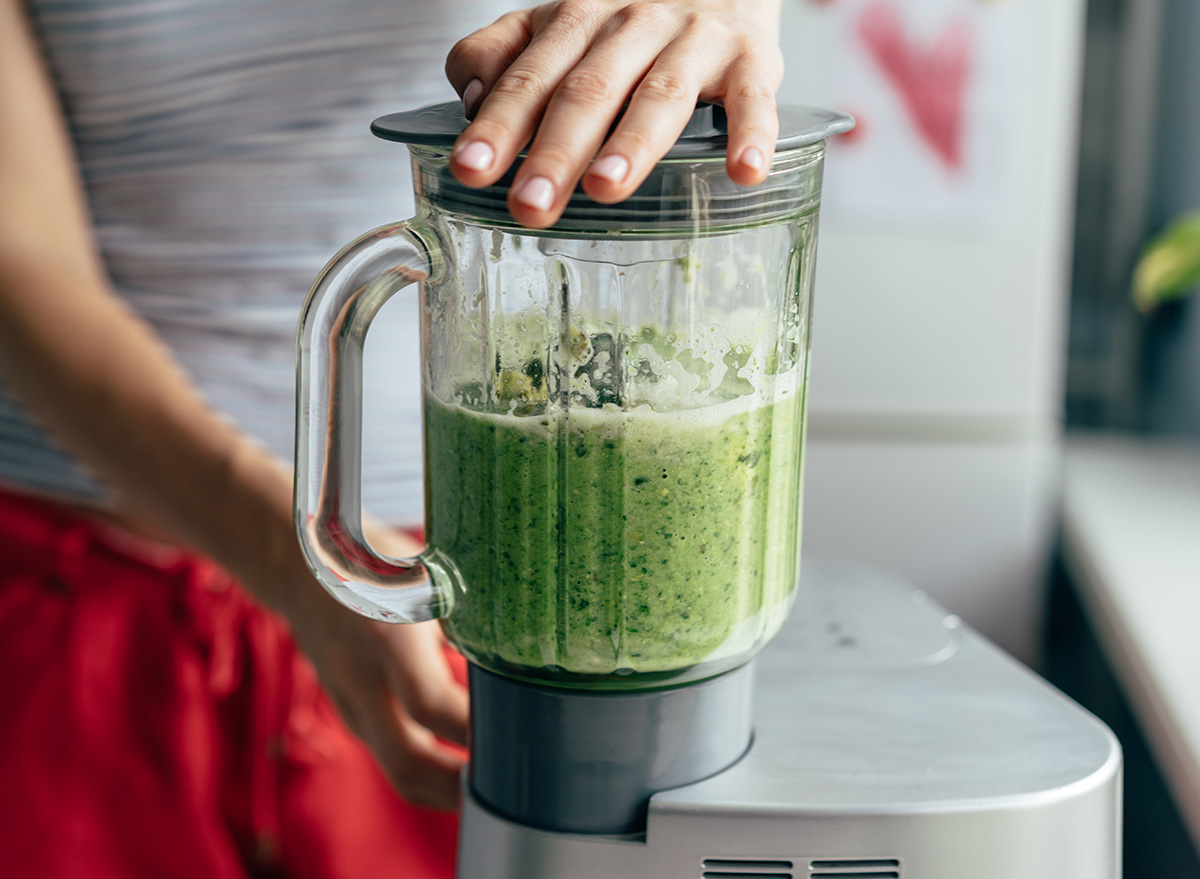
Unless you want to feel hungry again in an hour or two, experts definitely recommend making sure your breakfast includes a protein source. This is especially crucial if you’re physically active or trying to build muscle.
“Every cell in our body contains protein, which means incorporating protein in your breakfast helps repair damaged cells and make new ones,” explains Spiewak. “Protein also helps keep us full longer so we will snack less during the day.”
Registered dietitian and nutritionist Lauren Harris-Pincus advises aiming for a minimum of 20 grams of protein in your first meal of the day.
“Research suggests a minimum of 20 grams of protein at breakfast to help minimize muscle loss as we age,” she says. “This is important to maintain strength and balance as well as supporting metabolism since we burn fewer calories when we lose muscle.”
It’s also worth noting that according to a 2013 study eating a high-protein breakfast can reduce “cravings-related” brain activity, and increase levels of a hormone associated with satiety. Those who ate a protein-packed breakfast were less likely to snack on fatty foods in the evening than those who ate cereal or nothing.
While the first foods that come to mind when it comes to protein might be eggs, cottage cheese, and Greek yogurt (which are all still excellent choices), Gorham notes that many whole grains like oats and quinoa are also high in protein—and contain dietary fiber to help fill you up, too.
Christensen suggests adding a scoop of protein powder to your morning bowl of oats or smoothie. Or try one of these 19 High Protein Breakfasts That Keep You Full.
Include a fat source.
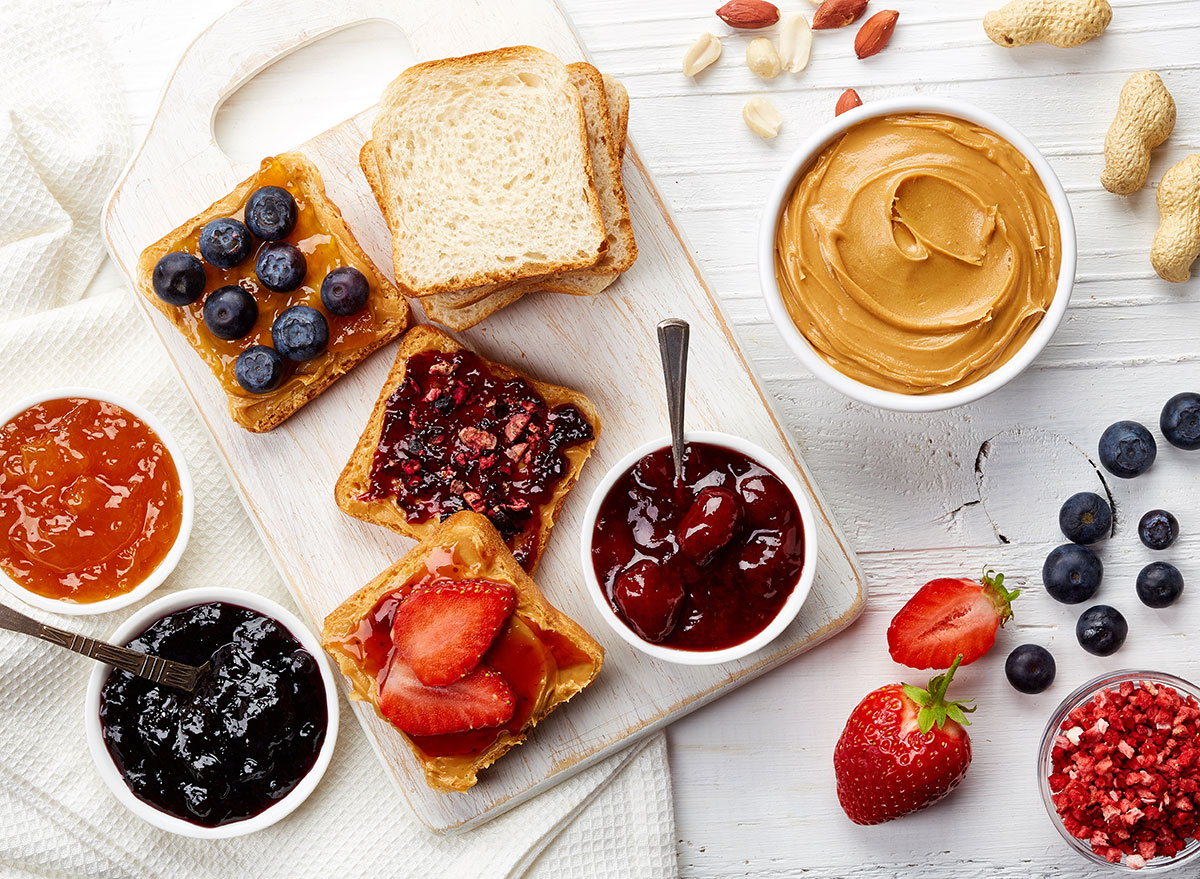
Experts say there’s no reason to fear fat—in fact, it’s a macronutrient that you definitely don’t want to miss at breakfast time. As Gorham points out, fat takes the body longer to digest than many other nutrients, which is why it can keep those hunger pangs at bay all morning long.
“Fats not only help us to feel full longer, but they’re needed to actually absorb some of the nutrients we eat,” explains Christensen.
Spiewak adds that fat helps to balance out your blood sugar levels, avoid fatigue, and provide you with consistent energy throughout the day. All that said, Miller recommends keeping portion control in mind when it comes to calorie-dense foods like nut butter and cheese. And whenever you can, try to seek out foods that are high in heart-healthy monounsaturated fats (like almonds and avocados) and polyunsaturated fats (like walnuts and flax seeds)
Practice mindfulness.
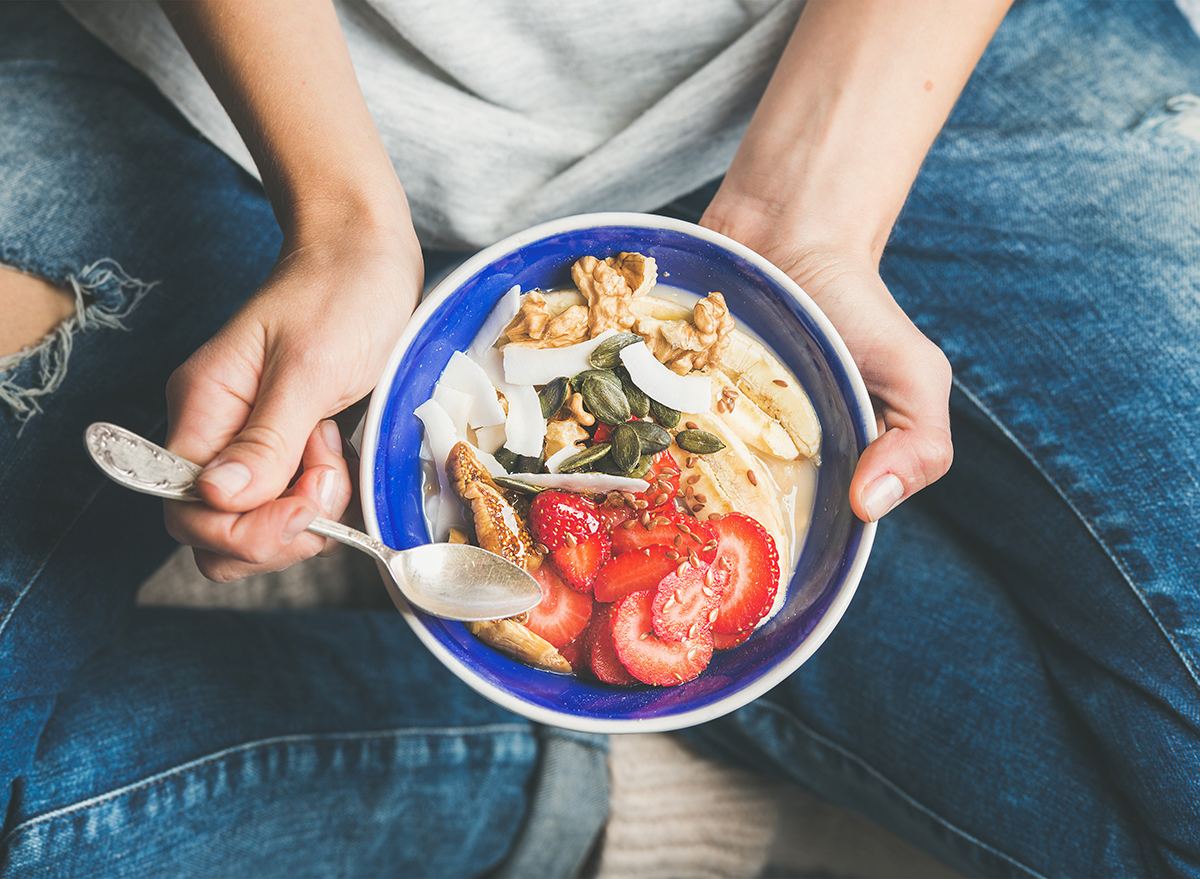
On busy mornings, it can be tempting to scarf down a sandwich while you’re on your commute or checking your work email at your desk, but experts say that eating breakfast when you feel rushed or distracted isn’t ideal. Rather than eating cereal straight from the box or yogurt right from the container, put together a plate, sit down and enjoy it. Nancy Courduff, a clinical dietitian with Stella Maris, says This will allow you to be more aware of when you’re feeling satisfied, thus preventing overeating.
“When we rush through breakfast, we may not feel totally satisfied since we didn’t take the time to eat, savor and enjoy it,” says Miller. “Then, we may reach for an extra snack on-the-go or start eating a bagel in the breakroom at work. When you dedicate time to sit down and eat breakfast, you’ll enjoy the meal and feel more satisfied so you can last until lunch.”
One of Christensen’s favorite mindful eating exercises is to ask yourself ‘What does this food taste like?’ while you’re chowing down.
And while mindful eating is a wonderful practice to adopt, registered dietitian Katherine Kimber says if it’s ever a matter of skipping breakfast or grabbing something on the go, it’s always better to eat something. So why not make yourself one of these 91+ Best Healthy Breakfast Recipes?
Make coffee at home.
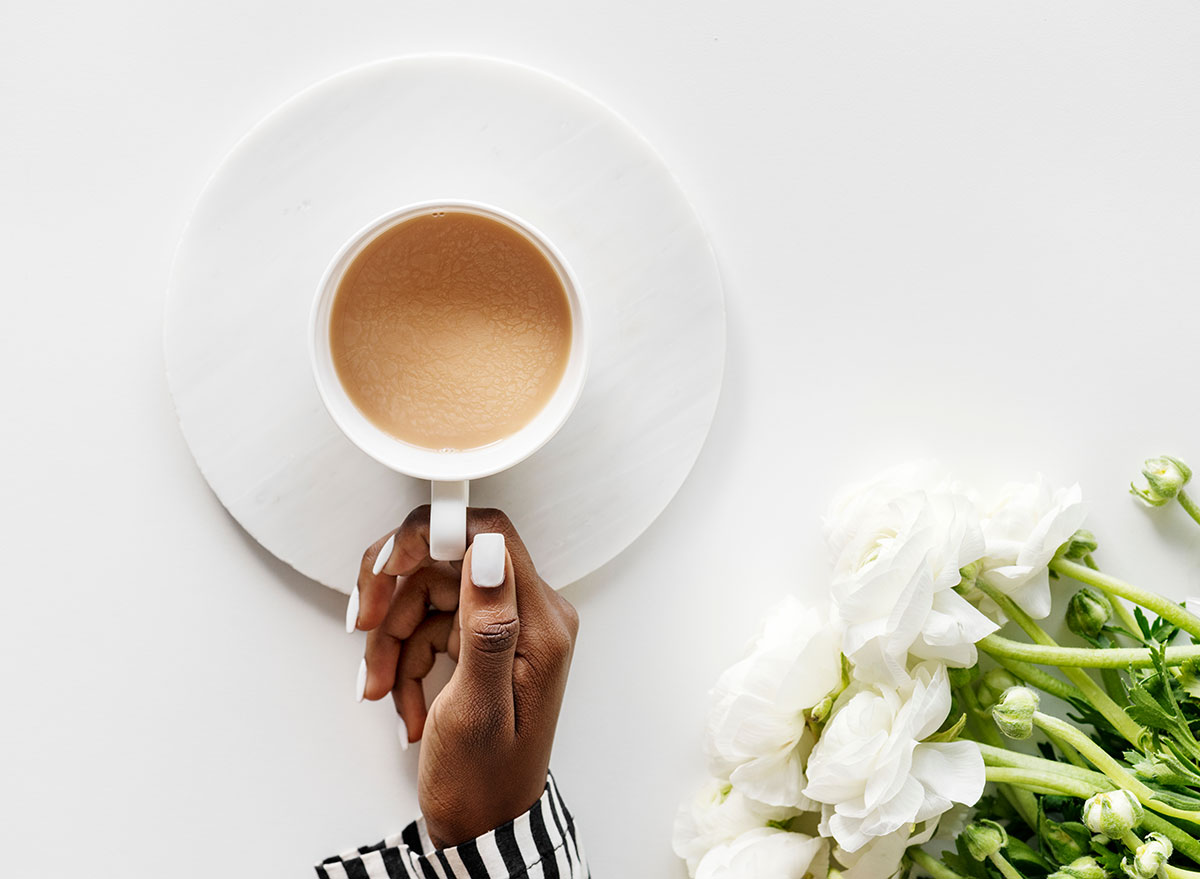
That daily latte habit may not only be draining your wallet but also potentially adding sneaky amounts of sugar and saturated fat to your diet.
“If you drink two cups of coffee each with 2 ounces of cream and 2 teaspoons of sugar, this means you are consuming about 300 calories and 24 grams of fat—about the same calories and twice the fat of a slice of pumpkin pie,” explains Zive. “If you make your coffee, you can control the amount of creamer (or milk) and sugar you put into your cup.”
What’s worse, Gorham notes that sugary coffee drinks may contribute to an energy crash later in the day, which can impact your productivity at work.
Obviously, there’s nothing wrong with adding a little sweetener, milk, or cream to your coffee—but the point is, by making it at home, you’ll likely find a recipe that tastes just as good, but makes you feel better. Here are 9 Tricks for the Best-Ever Cup of Coffee.
Aim for plenty of fiber.
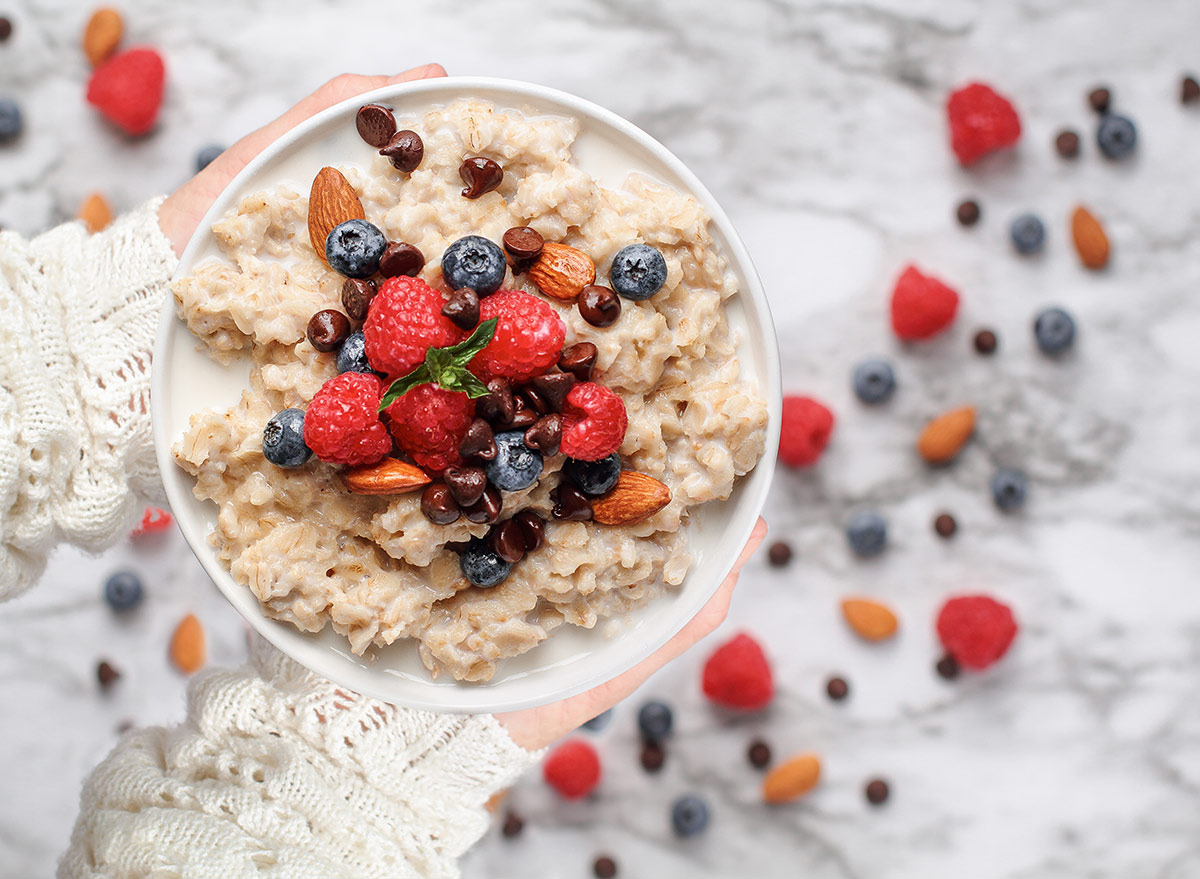
Did you know that a whopping 95% of Americans don’t meet the daily recommended intake for fiber—which is 25 grams for women. Getting adequate fiber at breakfast makes it much easier to reach your goals for the day,” says Harris-Pincus. “I suggest aiming for 8 grams of fiber (1/3 of your daily value) at breakfast.”
Need more incentive to up your fiber intake? A 2015 study published in Annals of Internal Medicine suggested that eating 30 grams of fiber each day can help you lose weight, lower your blood pressure, and improve your body’s response to insulin.
Harris-Pincus suggests adding a serving of raspberries or blackberries to your oatmeal or yogurt parfait.Or enjoy a high-fiber cereal.
Take your lifestyle and hunger cues into account.
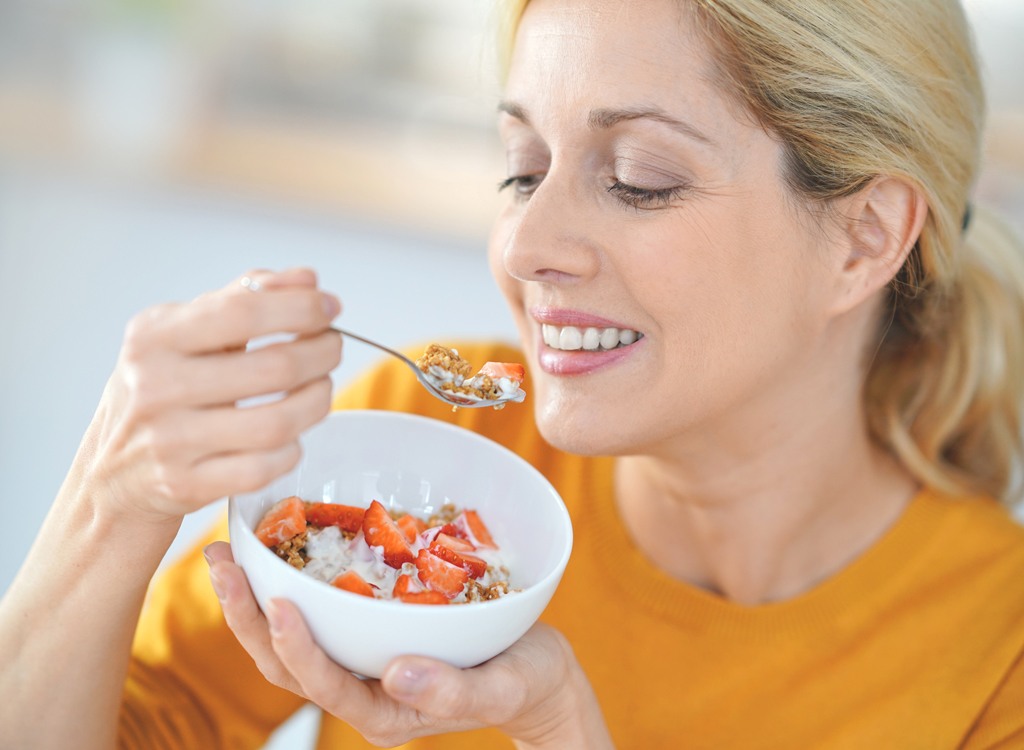
Newsflash: there’s no one-size-fits-all healthy breakfast, which is why it’s supremely important to consider your lifestyle.
“Eat what feels right for your body, and use your mind to consider the practicalities of your day,” says Kimber. “For example, maybe you’re not very hungry, but you know you’re going into a long meeting or heading out where food won’t be accessible. Therefore, it might be sensible to eat something despite not feeling that hungry. Alternatively, snacking on the go can be a handy way to keep you energized and ensure you’re not overly ravenous when approaching lunch.”
If you have a physically demanding job, for example, you may want to opt for a hearty combo of protein and slow-digesting carbs in the morning, like a veggie omelet with whole-wheat toast. On the other hand, if you’re more sedentary at work and don’t have much of an appetite in the morning, you might feel satisfied with a yogurt-based fruit smoothie, or an apple with peanut butter.
Not sure what’s the best breakfast for you to eat? Here are The Best Breakfasts for Weight Loss, According to Your Lifestyle.
